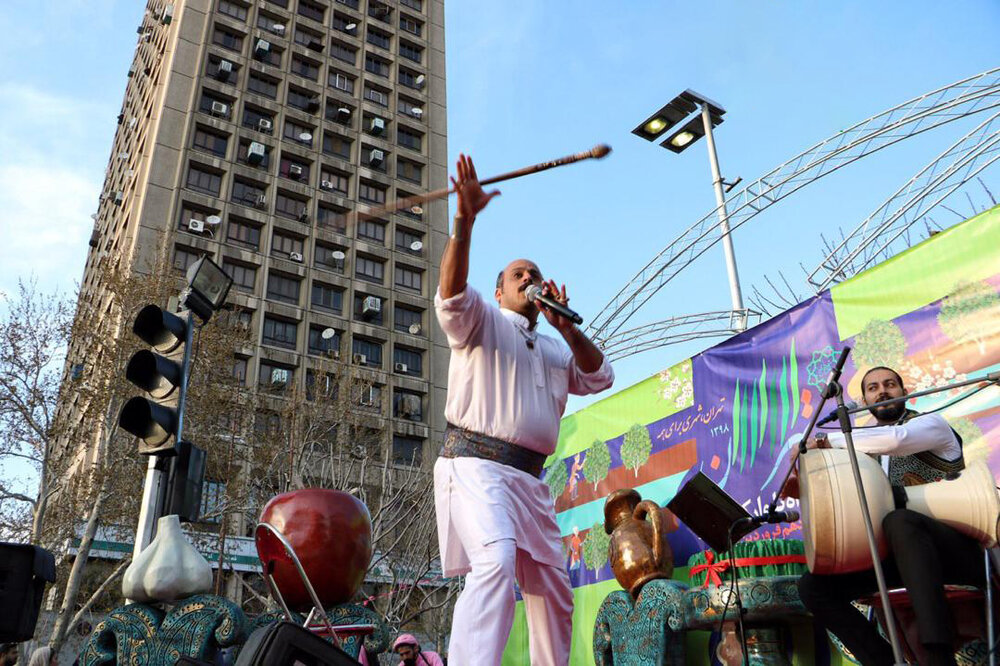Naqqali perfect medium to present Shahnameh stories: performer Mirza-Ali

TEHRAN – Morshed Mohsen Mirza-Ali has said that naqqali is the most powerful medium for presenting stories from the Shahnameh, Persian poet Ferdowsi’s epic masterpiece.
Naqqali is a dramatic style of storytelling dedicated to stories from the Shahnameh and other epic Persian stories, and someone who performs naqqali is called a morshed or naqqal.
The Shahnameh contains stories of legendary Iranian kings and heroes.
“You can give the naqqals pieces of old texts from the Shahnameh, or Persian poets like Sadi and Hafez, and they can make and produce the best out of them,” he told the Tehran Times in an interview on Wednesday.
“Many TV series, films and plays have been made to present stories from the Shahnameh,” he said and added that only naqqals and Shahnameh reciters can make the best impact by their performances.
“I believe the duty of a naqqal is to preserve and promote Persian literature, especially the Shahnameh,” he said.
Mirza-Ali is the director of Tazieh and Ritual Arts Office of Tehran’s Art Bureau. He is also the executive secretary of an online festival of naqqali and Shahnameh recitation, which the Art Bureau plans to organize.
“The Dramatic Arts Center of the bureau has been concerned about Persian language and literature and that is why a festival with the central theme of naqqali and recitation of stories of the Shahnameh has been set up,” he added.
Interested appliances including children, young adults and adults have been asked to submit their videos of naqqali, or recitations of the Shahnameh in different local dialects to the festival.
The works will be judged in two female and male categories.
“Performers from Isfahan, Shiraz, Tehran, Khorasan and many other Iranian cities have been invited to recite stories of the Shahnameh in their local dialects and submit them to the organizers,” he explained.
“This way we actually intend to take the Shahnameh from off the shelves in houses and place it into the real lives of the people,” he said.
“Innovation is one of the festival’s priorities. Those who can make the best use of the virtual world to better represent their naqqali performances and Shahnameh recitations will be of high significance,” he remarked.
He added that the festival has so far been warmly received and has received many submissions from different regions.
The works will be judged by juries at the Dramatic Art center of the bureau and winners will be announced on May 24.
“This shows that our people are interested in the Shahnameh. This is the very first festival the Art Bureau has launched,” he said.
He noted that the organizers plan to make it an international event for the coming editions.
“We have Tajik people who speak Persian. Our neighboring countries and the Iranians residing outside the country can also take part in the next editions,” he said.
He added that he is surprised that the younger generations have enthusiastically welcomed naqqali over the past decade.
“I can say we are facing a tsunami of narrators and reciters these days,” he noted.
“This is precious and the festival aims to promote it,” he said.
“However, this warm welcome must be organized because they need good masters. We have many good parents who would like their children to enter the world of literature through naqqali, but they are not very familiar with experts and they need masters and experts to be trained,” he asserted.
He also noted that in the past time naqqali was a male occupation but today that has changed and more females are showing interest.
“These girls will be mothers in the future and how good it is that mothers know how to beautifully narrate stories. And now, the females are brilliant and shine well in naqqali, and I am so happy with it. They have their share in training children and they have their shares in the art of naqqali,” he said.
“The festival wants to preserve the Persian language and transfer this national identity to the younger generation,” he concluded.
Photo: Morshed Mohsen Mirza-Ali performs naqqali during Noruz in Tehran in March 2017.
RM/MMS/YAW
Leave a Comment